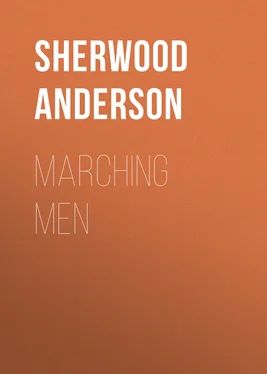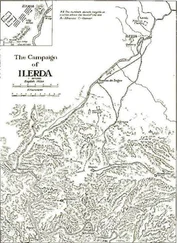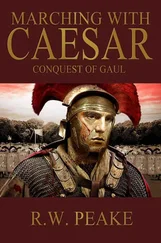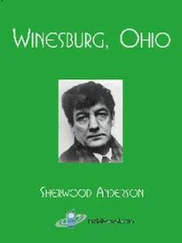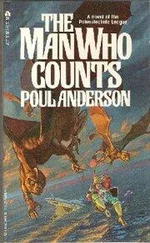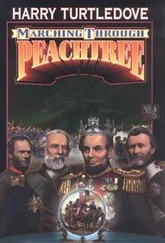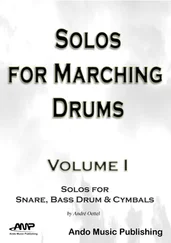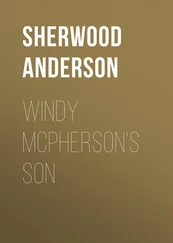Sherwood Anderson - Marching Men
Здесь есть возможность читать онлайн «Sherwood Anderson - Marching Men» — ознакомительный отрывок электронной книги совершенно бесплатно, а после прочтения отрывка купить полную версию. В некоторых случаях можно слушать аудио, скачать через торрент в формате fb2 и присутствует краткое содержание. Жанр: foreign_prose, literature_20, foreign_antique, на английском языке. Описание произведения, (предисловие) а так же отзывы посетителей доступны на портале библиотеки ЛибКат.
- Название:Marching Men
- Автор:
- Жанр:
- Год:неизвестен
- ISBN:нет данных
- Рейтинг книги:5 / 5. Голосов: 1
-
Избранное:Добавить в избранное
- Отзывы:
-
Ваша оценка:
- 100
- 1
- 2
- 3
- 4
- 5
Marching Men: краткое содержание, описание и аннотация
Предлагаем к чтению аннотацию, описание, краткое содержание или предисловие (зависит от того, что написал сам автор книги «Marching Men»). Если вы не нашли необходимую информацию о книге — напишите в комментариях, мы постараемся отыскать её.
Marching Men — читать онлайн ознакомительный отрывок
Ниже представлен текст книги, разбитый по страницам. Система сохранения места последней прочитанной страницы, позволяет с удобством читать онлайн бесплатно книгу «Marching Men», без необходимости каждый раз заново искать на чём Вы остановились. Поставьте закладку, и сможете в любой момент перейти на страницу, на которой закончили чтение.
Интервал:
Закладка:
When the tall red-haired boy looked at the workers and at the old woman who followed the soldiers he did not sympathise with them. He hated them. In a way he sympathised with the soldiers. His blood was stirred by the sight of them marching shoulder to shoulder. He thought there was order and decency in the rank of uniformed men moving silently and quickly along and he half wished they would destroy the town. When the strikers made a wreck of the garden of the Italian he was deeply touched and walked up and down in the room before his mother, proclaiming himself. “I would have killed them had it been my garden,” he said. “I would not have left one of them alive.” In his heart he like Cracked McGregor nursed his hatred of the miners and of the town. “The place is one to get out of,” he said. “If a man doesn’t like it here let him get up and leave.” He remembered his father working and saving for the farm in the valley. “They thought him cracked but he knew more than they. They would not have dared touch a garden he had planted.”
In the heart of the miner’s son strange half-formed thoughts began to find lodgings. Remembering in his dreams at night the moving columns of men in their uniforms he read new meaning into the scraps of history picked up in the school and the movements of men in old history began to have significance for him. On a summer afternoon as he loitered before the town’s hotel, beneath which was the saloon and billiard room where the black-haired boy worked, he overheard two men talking of the significance of men.
One of the men was an itinerant oculist who came to the mining town once a month to fit and sell spectacles. When the oculist had sold several pairs of spectacles he got drunk, sometimes staying drunk for a week. When he was drunk he spoke French and Italian and sometimes stood in the barroom before the miners, quoting the poems of Dante. His clothes were greasy from long wear and he had a huge nose streaked with red and purple veins. Because of his learning in the languages and his quoting of poems the miners thought the oculist infinitely wise. To them it seemed that one with such a mind must have almost unearthly knowledge concerning the eyes and the fitting of glasses and they wore with pride the cheap ill-fitting things he thrust upon them.
Occasionally, as though making a concession to his patrons, the oculist spent an evening among them. Once after reciting one of the sonnets of Shakespeare he put a hand on the bar and rocking gently back and forth sang in a drink-broken voice a ballad beginning “The harp that once through Tara’s halls the soul of music shed.” After the song he put his head down upon the bar and wept while the miners looked on touched with sympathy.
On the summer afternoon when Beaut McGregor listened, the oculist was engaged in a violent quarrel with another man, drunk like himself. The second man was a slender dandified fellow of middle age who sold shoes for a Philadelphia jobbing-house. He sat in a chair tilted against the hotel and tried to read aloud from a book. When he was fairly launched in a long paragraph the oculist interrupted. Staggering up and down the narrow board walk before the hotel the old drunkard raved and swore. He seemed beside himself with wrath.
“I am sick of such slobbering philosophy,” he declared. “Even the reading of it makes you drool at the mouth. You do not say the words sharply, and they can’t be said sharply. I’m a strong man myself.”
Spreading his legs wide apart and blowing up his cheeks, the oculist beat upon his breast. With a wave of his hand he dismissed the man in the chair.
“You but slobber and make a foul noise,” he declared. “I know your kind. I spit upon you. The Congress at Washington is full of such fellows as is also the House of Commons in England. In France they were once in charge. They ran things in France until the coming of a man such as myself. They were lost in the shadow of the great Napoleon.”
The oculist as though dismissing the dandified man from his mind turned to address Beaut. He talked in French and the man in the chair fell into a troubled sleep. “I am like Napoleon,” the drunkard declared, breaking again into English. Tears began to show in his eyes. “I take the money of these miners and I give them nothing. The spectacles I sell to their wives for five dollars cost me but fifteen cents. I ride over these brutes as Napoleon rode over Europe. There would be order and purpose in me were I not a fool. I am like Napoleon in that I have utter contempt for men.”
Again and again the words of the drunkard came back into the mind of the McGregor boy influencing his thoughts. Grasping nothing of the philosophy back of the man’s words his imagination was yet touched by the drunkard’s tale of the great Frenchman, babbled into his ears, and it in some way seemed to give point to his hatred of the disorganised ineffectiveness of the life about him.
After Nance McGregor opened the bakery another strike came to disturb the prosperity of the business. Again the miners walked idly through the streets. Into the bakery they came to get bread and told Nance to write the debt down against them. Beaut McGregor was disturbed. He saw his father’s money being spent for flour which when baked into loaves went out of the shop under the arms of the miners who shuffled as they walked. One night a man whose name appeared on their books followed by a long record of charged loaves came reeling past the bakery. McGregor went to his mother and protested. “They have money to get drunk,” he said, “let them pay for their loaves.”
Nance McGregor went on trusting the miners. She thought of the women and children in the houses on the hill and when she heard of the plans of the mining company to evict the miners from their houses she shuddered. “I was the wife of a miner and I will stick to them,” she thought.
One day the mine manager came into the bakery. He leaned over the showcase and talked to Nance. The son went and stood by his mother’s side to listen. “It has got to be stopped,” the manager was saying. “I will not see you ruin yourself for these cattle. I want you to close this place till the strike is over. If you won’t close it I will. The building belongs to us. They did not appreciate what your husband did and why should you ruin yourself for them?”
The woman looked at him and answered in a low tone full of resolution. “They thought he was crazy and he was,” she said; “but what made him so—the rotten timbers in the mine that broke and crushed him. You and not they are responsible for my man and what he was.”
Beaut McGregor interrupted. “Well I think he is right,” he declared, leaning over the counter beside his mother and looking into her face. “The miners don’t want better things for their families, they want more money to get drunk. We will close the doors here. We will put no more money into bread to go into their gullets. They hated father and he hated them and now I hate them also.”
Beaut walked around the end of the counter and went with the mine manager to the door. He locked it and put the key into his pocket. Then he walked to the rear of the bake shop where his mother sat on a box weeping. “It is time a man took charge here,” he said.
Nance McGregor and her son sat in the bakery and looked at each other. Miners came along the street, tried the door and went away grumbling. Word ran from lip to lip up the hillside. “The mine manager has closed Nance McGregor’s shop,” said the women leaning over back fences. Children sprawling on the floors of the houses put up their heads and howled. Their lives were a succession of new terrors. When a day passed that a new terror did not shake them they went to bed happy. When the miner and his woman stood by the door talking in low tones they cried, expecting to be put to bed hungry. When guarded talk did not go on by the door the miner came home drunk and beat the mother and the children lay in beds along the wall trembling with fright.
Читать дальшеИнтервал:
Закладка:
Похожие книги на «Marching Men»
Представляем Вашему вниманию похожие книги на «Marching Men» списком для выбора. Мы отобрали схожую по названию и смыслу литературу в надежде предоставить читателям больше вариантов отыскать новые, интересные, ещё непрочитанные произведения.
Обсуждение, отзывы о книге «Marching Men» и просто собственные мнения читателей. Оставьте ваши комментарии, напишите, что Вы думаете о произведении, его смысле или главных героях. Укажите что конкретно понравилось, а что нет, и почему Вы так считаете.
